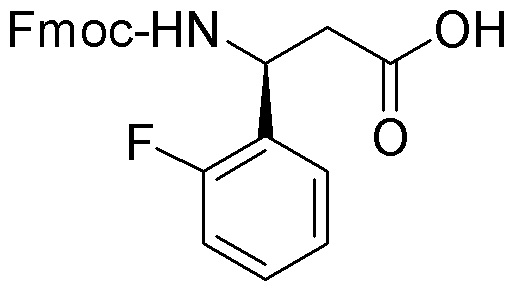Fmoc-(S)-3-amino-3-(2-fluorophenyl)propionic acid is widely utilized in research focused on:
- Peptide Synthesis: This compound serves as a key building block in the synthesis of peptides, particularly in solid-phase peptide synthesis (SPPS), allowing for the creation of complex peptide structures with high purity.
- Drug Development: Its unique fluorinated phenyl group enhances the pharmacological properties of peptides, making it valuable in the pharmaceutical industry for developing new therapeutic agents.
- Bioconjugation: The compound can be used in bioconjugation techniques, facilitating the attachment of peptides to various biomolecules, which is crucial in creating targeted drug delivery systems.
- Research in Neuroscience: This chemical is employed in studies related to neurotransmitter systems, helping researchers understand the role of specific amino acids in brain function and potential treatments for neurological disorders.
- Analytical Chemistry: It is used as a standard in analytical methods, aiding in the characterization and quantification of peptides in various biological samples, which is essential for quality control in research and clinical settings.
General Information
Properties
Safety and Regulations
Applications
Fmoc-(S)-3-amino-3-(2-fluorophenyl)propionic acid is widely utilized in research focused on:
- Peptide Synthesis: This compound serves as a key building block in the synthesis of peptides, particularly in solid-phase peptide synthesis (SPPS), allowing for the creation of complex peptide structures with high purity.
- Drug Development: Its unique fluorinated phenyl group enhances the pharmacological properties of peptides, making it valuable in the pharmaceutical industry for developing new therapeutic agents.
- Bioconjugation: The compound can be used in bioconjugation techniques, facilitating the attachment of peptides to various biomolecules, which is crucial in creating targeted drug delivery systems.
- Research in Neuroscience: This chemical is employed in studies related to neurotransmitter systems, helping researchers understand the role of specific amino acids in brain function and potential treatments for neurological disorders.
- Analytical Chemistry: It is used as a standard in analytical methods, aiding in the characterization and quantification of peptides in various biological samples, which is essential for quality control in research and clinical settings.
Documents
Safety Data Sheets (SDS)
The SDS provides comprehensive safety information on handling, storage, and disposal of the product.
Product Specification (PS)
The PS provides a comprehensive breakdown of the product’s properties, including chemical composition, physical state, purity, and storage requirements. It also details acceptable quality ranges and the product's intended applications.
Certificates of Analysis (COA)
Search for Certificates of Analysis (COA) by entering the products Lot Number. Lot and Batch Numbers can be found on a product’s label following the words ‘Lot’ or ‘Batch’.
Numéro de catalogue
Numéro de lot/série
Certificates Of Origin (COO)
This COO confirms the country where the product was manufactured, and also details the materials and components used in it and whether it is derived from natural, synthetic, or other specific sources. This certificate may be required for customs, trade, and regulatory compliance.
Numéro de catalogue
Numéro de lot/série
Safety Data Sheets (SDS)
The SDS provides comprehensive safety information on handling, storage, and disposal of the product.
DownloadProduct Specification (PS)
The PS provides a comprehensive breakdown of the product’s properties, including chemical composition, physical state, purity, and storage requirements. It also details acceptable quality ranges and the product's intended applications.
DownloadCertificates of Analysis (COA)
Search for Certificates of Analysis (COA) by entering the products Lot Number. Lot and Batch Numbers can be found on a product’s label following the words ‘Lot’ or ‘Batch’.
Numéro de catalogue
Numéro de lot/série
Certificates Of Origin (COO)
This COO confirms the country where the product was manufactured, and also details the materials and components used in it and whether it is derived from natural, synthetic, or other specific sources. This certificate may be required for customs, trade, and regulatory compliance.


